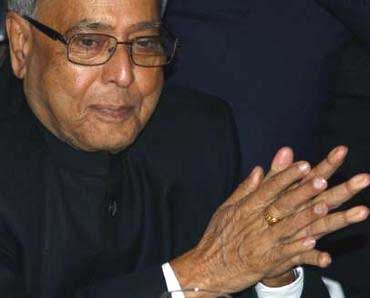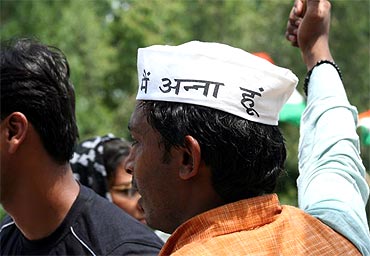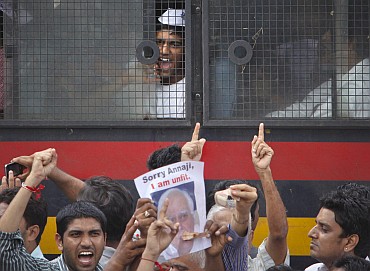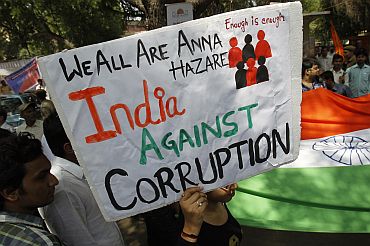
Democracies also need to be wary. They are not immune to public ire. Elected governments cannot remain complacent with the nominal trappings of a democracy or seek refuge in constitutional jargon but must conform to the spirit of the concept if they do not wish to be swept aside by the rising tide of public fury, says Vivek Gumaste.
The wild accusations against Anna Hazare intonated in increasingly higher decibels, the self righteous invocation of constitutional power, the contrived technical hurdles to his proposed hunger strike and finally his arrest and proposed release are acts of a beleaguered, confused and panicked government determined to protect its vested interests; not a genuine attempt to resolve a national issue.
Nothing that the government has done or advanced in its defence with regard to the current imbroglio passes muster. On the contrary, with each utterance and each action the government is digging itself deeper and deeper into a black hole of no return.
Earlier, Pranab Mukherjee, the government's troubleshooter-in-chief had pontificated: "Nobody can be compelled that a law has to be drafted as per his or her desire. It is for Parliament to decide And what Anna Hazare is doing is akin to challenging the constitutional authority of Parliament which is not acceptable "

This superficial analysis reduces the current altercation to a simplistic tussle between a constitutional authority and an extra-constitutional surge; an argument that may subscribe to the letter of democracy but certainly not to its spirit.
Our approach to this raging debate needs to be direct and sincere. First and foremost, there can be no moral or practical dilemma about the depravity of corruption or the ill effects of black money stashed away in foreign banks: both issues need to be addressed promptly.
This is a precept that the political class must understand and embrace without any second thoughts. It is the government's dithering, nitpicking and arbitrary caveats (exclusion of the prime minister) with regard to the Lokpal Bill that is fuelling the storm of public protest and casting doubts on the intentions of the establishment.
A popular movement that espouses firm moral principles cannot be wished away by dubbing it as unconstitutional or as being engineered by vested interests.

Moreover, the charge that civil society has hijacked the role of the government is ridiculous. Civil society is not a tangible, preordained body with a definite agenda eager to pounce on the government and usurp its authority.
Civil society is a sleeping giant that needs to be prodded or provoked into action. Civil society is an elastic entity whose potency fluctuates, its intensity being inversely proportional to the degree of depravity and directly proportional to the level of government indifference.
Civil society, which the government depicts as a Frankenstein is a creation of its own making; the result of its unbridled foibles and its stark insensitivity to public concerns as evidenced by its turning a blind eye to the shenanigans of its minions.
Civil society was forced to step in as a monitor in the face of inept leadership and lax regulatory oversight.
Can every two-bit activist claim to represent civil society? Can he or she be allowed to hold a legitimate government to ransom by threatening a hunger strike? The answer is no. Every agitation needs to be evaluated on its individual merits.

An honest and objective appraisal of the current movement leads one to believe that the issue is both genuine and compelling.
Additionally, whether Baba Ramdev's financial holdings are suspect or whether Anna Hazare himself is corrupt or whether Team Anna consists of, "armchair fascists, overground Maoists, closet anarchists," as alleged by the Congress spokesman Manish Tiwari is immaterial to the crux of the issue; these are topics of discussion for another day.
The charge of rampant corruption is valid and the government by virtue of being the presiding authority is duty bound to address the issue regardless of the source from which it emanates; counter defamation is not the answer.
While constant interference by civil society in the working of the government can be irksome and counterproductive and is not welcome, civil society reserves the right to intervene whenever it deems appropriate especially in times of gubernatorial delinquency.
Neither can this intervention be restricted to the electoral process that occurs once every five years allowing unscrupulous politicians a free reign in the intervening period.

With the next elections slated for 2014, that is nearly three years down the road, deferral of action by civil society would have encouraged continued wrongdoing with irreparable harm.
Civil society had no other option but to adopt an unorthodox and seemingly untimely intervention.
The notion that a strong arm stratagem will bolster the credibility of the government is intrinsically flawed and dangerous.
The writ of a government is not demonstrated by raining blows on unarmed citizens or locking up activists; it is judged by its effectiveness in resolving issues and by being in tune with the aspirations of its citizens.
The Arab Spring was a frank manifestation of awareness and restiveness at the level of the individual finding collective expression through mass uprisings against ham handed dictatorial regimes.

Analysed at a deeper level, these movements were basically attempts to right wrongs and have the potential to surface where ever injustice exists, regardless of the type of government.
Democracies also need to be wary. They are not immune to public ire.
Elected governments cannot remain complacent with the nominal trappings of a democracy or seek refuge in constitutional jargon but must conform to the spirit of the concept if they do not wish to be swept aside by the rising tide of public fury.
If the Indian summer is not to turn into an Arab Spring, the government must shed its arrogance and reach out to the public with sincerity.
Its bullheadedness is placing its own survival in jeopardy and sullying the image of Indian democracy abroad.
To defuse the situation, the government must act immediately to incorporate the views of civil society into a unified Lokpal Bill to be debated in Parliament before finalisation: an approach that would be universally acceptable.